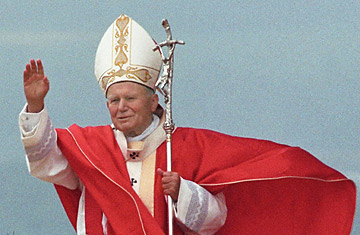
Pope John Paul II waves to a crowd in Gniezno, Poland, during a visit to his native country in 1997
(3 of 8)
Agca laughed briefly a few times, but the smile would then quickly fade from his face. In the first months after the assassination attempt, there had been in Agca's eyes a zealot's burning glare. But now his face wore a confused, uncertain expression, never hostile. The Pope clasped Agca's hands in his own from time to time. At other times he grasped the man's arm, as if in a gesture of support.
John Paul's words were intended for Agca alone. "What we talked about will have to remain a secret between him and me," the Pope said as he emerged from the cell. "I spoke to him as a brother whom I have pardoned, and who has my complete trust." As John Paul rose to leave, the two men shook hands. The Pope gave Agca, who will turn 26 next week, a small gift in a white box, a rosary in silver and mother-of-pearl. The Pope walked out. Agca was left standing alone, and the camera recorded a sudden look of uncertainty on his face. Perhaps he was thinking about the prospect of spending the rest of his life in jail for attempting to kill a man he did not know, a man who now came to him as a friend.
Later, John Paul spoke to the women inmates of the prison about what had happened on this "historic day." Said the Pontiff: "In the context of Christmas and the Holy Year of Redemption, I was able to meet with the person that you all know by name, Ali Agca, who in the year 1981 on the 13th of May made an attempt on my life. But Providence took things in its own hands, in what I would call an extraordinary way, so that today after two years I was able to meet my assailant and repeat to him the pardon I gave him immediately ... The Lord gave us the grace to meet as men and brothers, because all the events of our lives must confirm that God is our father and all of us are His children in Jesus Christ, and thus we are all brothers."
Down in the murkier reaches of the affair, meantime, Italian authorities seemed ready to make a decision about whether to pursue the "Bulgarian connection." Agca has insisted that he had three Bulgarian accomplices in the assassination plot. One of them, said the gunman, was Sergei Ivanov Antonov, once the Rome manager of Bulgaria's national airline. Agca has offered detailed but sometimes conflicting recollections of a labyrinthine plot involving the Bulgarians, right-wing Turks and, ultimately, the Soviet KGB. Agca claims that Antonov drove him to St. Peter's Square on the day of the shooting. Italian investigators are trying to decide whether to indict Antonov or dismiss the case.
The scene in Rebibbia had a symbolic splendor. It shone in lovely contrast to what the world has witnessed lately in the news. For some time, a suspicion has taken hold that the trajectory of history is descendant, that the world moves from disorder to greater disorder, toward darkness—or else toward the terminal global flash. The symbolism of the pictures from Rebibbia is precisely the Christian message, that people can be redeemed, that they are ascendant toward the light. In a less exalted sense, the scene may be important because it suggests that human beings can respond to inhuman acts by being sane and civilized and forbearing, more decent, perhaps, than the killers deserve.
